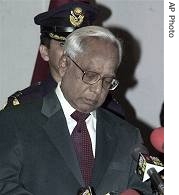-
(单词翻译:双击或拖选)
By Anjana Pasricha
New Delhi
29 October 2006
In Bangladesh, the president has been sworn in as head of the country's interim1 government, after main political parties failed to agree on a candidate. But it is uncertain if the appointment will calm political tensions in the country, where disagreement on the issue has sparked deadly clashes that have killed 22 people and injured hundreds in recent days.
-----
 President Iajuddin Ahmed is sworn in as head of caretaker government, Oct. 29, 2006 |
||
President Ahmed takes over the reins4 of government from Prime Minister Khaleda Zia to oversee5 elections in January. He took the office after talks with political parties failed to produce a consensus6 on who should take the post. It is an issue that has fueled deep political tensions, and sparked deadly clashes in the country.
The earlier candidate chosen by the government to take the job stepped aside Saturday, after strong protests by opposition parties, which said he was biased7 in favor of the ruling party, and could not ensure fair polls.
The former ruling Bangladesh Nationalist Party has endorsed8 the president's decision to take charge of the interim government, saying he has acted in accordance with the constitution.
But the Awami League has opposed President Ahmed's takeover, and says he has violated the constitution by appointing himself for the job.
Political observers say it is likely that the opposition will press ahead with a program of protests and strikes that it had planned if a candidate that they support is not appointed.
The protests have gripped Dhaka since Friday, when Prime Minister Khaleda Zia's five-year term ended. More than 20 people have been killed in the street clashes and demonstrations9 held by opposition activists10 across the country, despite tight security.
The caretaker government system aims to prevent ruling parties from rigging polls by appointing a neutral, non-party administration to supervise them. But, this time, the transition has become the center of a political storm.
 收听单词发音
收听单词发音
1
interim

|
|
| adj.暂时的,临时的;n.间歇,过渡期间 | |
参考例句: |
|
|
|
2
diplomats

|
|
| n.外交官( diplomat的名词复数 );有手腕的人,善于交际的人 | |
参考例句: |
|
|
|
3
opposition

|
|
| n.反对,敌对 | |
参考例句: |
|
|
|
4
reins

|
|
| 感情,激情; 缰( rein的名词复数 ); 控制手段; 掌管; (成人带着幼儿走路以防其走失时用的)保护带 | |
参考例句: |
|
|
|
5
oversee

|
|
| vt.监督,管理 | |
参考例句: |
|
|
|
6
consensus

|
|
| n.(意见等的)一致,一致同意,共识 | |
参考例句: |
|
|
|
7
biased

|
|
| a.有偏见的 | |
参考例句: |
|
|
|
8
endorsed

|
|
| vt.& vi.endorse的过去式或过去分词形式v.赞同( endorse的过去式和过去分词 );在(尤指支票的)背面签字;在(文件的)背面写评论;在广告上说本人使用并赞同某产品 | |
参考例句: |
|
|
|
9
demonstrations

|
|
| 证明( demonstration的名词复数 ); 表明; 表达; 游行示威 | |
参考例句: |
|
|
|
10
activists

|
|
| n.(政治活动的)积极分子,活动家( activist的名词复数 ) | |
参考例句: |
|
|
|















